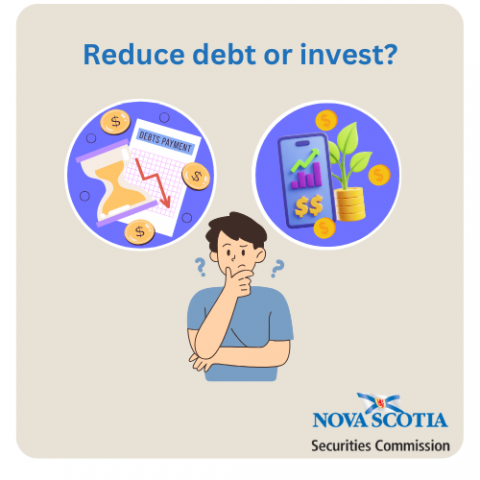Submitted by nsscadmin on

Canadians are carrying around a lot of debt. According to Transunion, the average balance on Canadian credit cards in the third quarter of 2024 was $4,562. That was up nearly seven percent from 2023. That debt is growing because according to a recent survey of Canadians, 48% carry credit cards balances month to month. This adds up quickly when you consider that according to the Bank of Canada, the average credit card interest rate is approximately 20%.
Since so many Canadians are carrying debt, whether it’s credit cards, payday loans, mortgages, or other types of personal debt, many likely have asked the question, should I pay down debt or invest any extra money I have?
This question can often come up this time of year when Canadians begin to receive their income tax refunds. It could also come up when you receive a bonus at work, or a financial gift or inheritance.
At the Nova Scotia Securities Commission we do not provide investment advice. We are not advising or recommending that you should pay off debt or invest your money. This post is simply to educate investors and outline factors to consider when deciding whether to invest or pay down debt. It is up to you to use this information to assess your own financial situation and determine the best path forward for you and your goals.
If you have asked yourself whether you should pay down debt or invest here are some things to consider:
How does the expected return from your investments compare to the interest you owe on your debt?
If you’re one of the millions of Canadians that are carrying high-interest credit card debt then paying down that debt may make more financial sense than investing. Here’s why. Let’s say you have $5,000 in credit card debt that has a 20% annual interest rate attached to it. While the interest is expressed as a yearly percentage (20%), it is actually calculated daily. With this balance and this interest rate, the interest is $2.74 per day, or $82.20 a month, where a month is 30 days. Investing makes sense if you can earn more money on the investment than your debts are costing you in interest. If this is not the case, you may be better off tackling the debt. If you have high-interest debt, most investments may not have a return that matches or exceeds the interest on the money you owe.
What is your risk tolerance?
Remember, whenever you’re investing, you’re taking a risk. That risk could include losing money, or in this case, not earning enough of a return to make investing the better option than paying down your debt. Can you tolerate a volatile market that may cause your investment to lose money? If this happens, the increase in your debt balance is outgrowing your investment value.
Does it have to be either/or?
Do you have to chose between paying down debt and investing? Is it possible and a viable option to do both? As we said previously, if you have high-interest debt it may be wise to tackle that before investing. But if your debt has more manageable interest, say 4-6% for example, you may be able to put a portion of your money toward your debt and a portion toward an investment. Do a few calculations to determine the cost of your debt and your expected average return from the investment to see how this could work in your favour. Of course, remember that these returns may not be guaranteed, and you may not achieve them.
Debt can be a scary thing, especially with how much debt many Canadians have taken on in recent years. If you are investing or plan to invest in the future make sure you look at your entire financial picture, including your debt, to ensure the right amount of money is going towards investing, without harming or getting in the way of the rest of your financial responsibilities.
